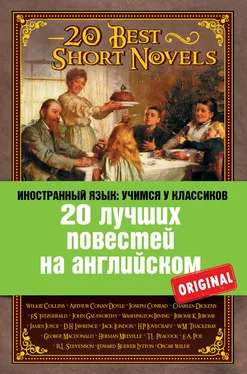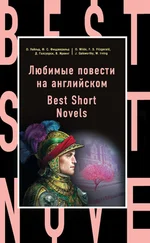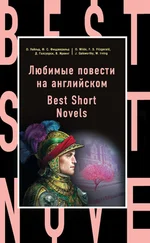One March night, however, we unexpectedly obtained a specimen which did not come from the potter’s field. In Bolton the prevailing spirit of Puritanism had outlawed the sport of boxing – with the usual result. Surreptitious and ill-conducted bouts among the mill-workers were common, and occasionally professional talent of low grade was imported. This late winter night there had been such a match; evidently with disastrous results, since two timorous Poles had come to us with incoherently whispered entreaties to attend to a very secret and desperate case. We followed them to an abandoned barn, where the remnants of a crowd of frightened foreigners were watching a silent black form on the floor.
The match had been between Kid O’Brien – a lubberly and now quaking youth with a most un-Hibernian [504]hooked nose – and Buck Robinson, ‘The Harlem [505]Smoke.’ The negro had been knocked out, and a moment’s examination shewed us that he would permanently remain so. He was a loathsome, gorilla-like thing, with abnormally long arms which I could not help calling fore legs, and a face that conjured up thoughts of unspeakable Congo [506]secrets and tom-tom [507]poundings under an eerie moon. The body must have looked even worse in life – but the world holds many ugly things. Fear was upon the whole pitiful crowd, for they did not know what the law would exact of them if the affair were not hushed up; and they were grateful when West, in spite of my involuntary shudders, offered to get rid of the thing quietly – for a purpose I knew too well.
There was bright moonlight over the snowless landscape, but we dressed the thing and carried it home between us through the deserted streets and meadows, as we had carried a similar thing one horrible night in Arkham. We approached the house from the field in the rear, took the specimen in the back door and down the cellar stairs, and prepared it for the usual experiment. Our fear of the police was absurdly great, though we had timed our trip to avoid the solitary patrolman of that section.
The result was wearily anticlimactic. Ghastly as our prize appeared, it was wholly unresponsive to every solution we injected in its black arm; solutions prepared from experience with white specimens only. So as the hour grew dangerously near to dawn, we did as we had done with the others – dragged the thing across the meadows to the neck of the woods near the potter’s field, and buried it there in the best sort of grave the frozen ground would furnish. The grave was not very deep, but fully as good as that of the previous specimen – the thing which had risen of itself and uttered a sound. In the light of our dark lanterns we carefully covered it with leaves and dead vines, fairly certain that the police would never find it in a forest so dim and dense.
The next day I was increasingly apprehensive about the police, for a patient brought rumours of a suspected fight and death. West had still another source of worry, for he had been called in the afternoon to a case which ended very threateningly. An Italian woman had become hysterical over her missing child – a lad of five who had strayed off early in the morning and failed to appear for dinner – and had developed symptoms highly alarming in view of an always weak heart. It was a very foolish hysteria, for the boy had often run away before; but Italian peasants are exceedingly superstitious, and this woman seemed as much harassed by omens [508]as by facts. About seven o’clock in the evening she had died, and her frantic husband had made a frightful scene in his efforts to kill West, whom he wildly blamed for not saving her life. Friends had held him when he drew a stiletto [509], but West departed amidst his inhuman shrieks, curses and oaths of vengeance. In his latest affliction the fellow seemed to have forgotten his child, who was still missing as the night advanced. There was some talk of searching the woods, but most of the family’s friends were busy with the dead woman and the screaming man. Altogether, the nervous strain upon West must have been tremendous. Thoughts of the police and of the mad Italian both weighed heavily.
We retired about eleven, but I did not sleep well. Bolton had a surprisingly good police force for so small a town, and I could not help fearing the mess which would ensue if the affair of the night before were ever tracked down. It might mean the end of all our local work – and perhaps prison for both West and me. I did not like those rumours of a fight which were floating about. After the clock had struck three the moon shone in my eyes, but I turned over without rising to pull down the shade. Then came the steady rattling at the back door.
I lay still and somewhat dazed, but before long heard West’s rap on my door. He was clad in dressing-gown and slippers, and had in his hands a revolver and an electric flashlight. From the revolver I knew that he was thinking more of the crazed Italian than of the police.
‘We’d better both go,’ he whispered. ‘It wouldn’t do not to answer it anyway, and it may be a patient – it would be like one of those fools to try the back door.’
So we both went down the stairs on tiptoe, with a fear partly justified and partly that which comes only from the soul of the weird small hours. The rattling continued, growing somewhat louder. When we reached the door I cautiously unbolted it and threw it open, and as the moon streamed revealingly down on the form silhouetted there, West did a peculiar thing. Despite the obvious danger of attracting notice and bringing down on our heads the dreaded police investigation – a thing which after all was mercifully averted by the relative isolation of our cottage – my friend suddenly, excitedly, and unnecessarily emptied all six chambers of his revolver into the nocturnal visitor.
For that visitor was neither Italian nor policeman. Looming hideously against the spectral moon was a gigantic misshapen thing not to be imagined save in nightmares – a glassy-eyed, ink-black apparition nearly on all fours, covered with bits of mould, leaves, and vines, foul with caked blood, and having between its glistening teeth a snow-white, terrible, cylindrical object terminating in a tiny hand.
The scream of a dead man gave to me that acute and added horror of Dr. Herbert West which harassed the latter years of our companionship. It is natural that such a thing as a dead man’s scream should give horror, for it is obviously, not a pleasing or ordinary occurrence; but I was used to similar experiences, hence suffered on this occasion only because of a particular circumstance. And, as I have implied, it was not of the dead man himself that I became afraid.
Herbert West, whose associate and assistant I was, possessed scientific interests far beyond the usual routine of a village physician. That was why, when establishing his practice in Bolton, he had chosen an isolated house near the potter’s field. Briefly and brutally stated, West’s sole absorbing interest was a secret study of the phenomena of life and its cessation, leading toward the reanimation of the dead through injections of an excitant solution. For this ghastly experimenting it was necessary to have a constant supply of very fresh human bodies; very fresh because even the least decay hopelessly damaged the brain structure, and human because we found that the solution had to be compounded differently for different types of organisms. Scores of rabbits and guinea-pigs had been killed and treated, but their trail was a blind one. West had never fully succeeded because he had never been able to secure a corpse sufficiently fresh. What he wanted were bodies from which vitality had only just departed; bodies with every cell intact and capable of receiving again the impulse toward that mode of motion called life. There was hope that this second and artificial life might be made perpetual by repetitions of the injection, but we had learned that an ordinary natural life would not respond to the action. To establish the artificial motion, natural life must be extinct – the specimens must be very fresh, but genuinely dead.
Читать дальше
Конец ознакомительного отрывка
Купить книгу












